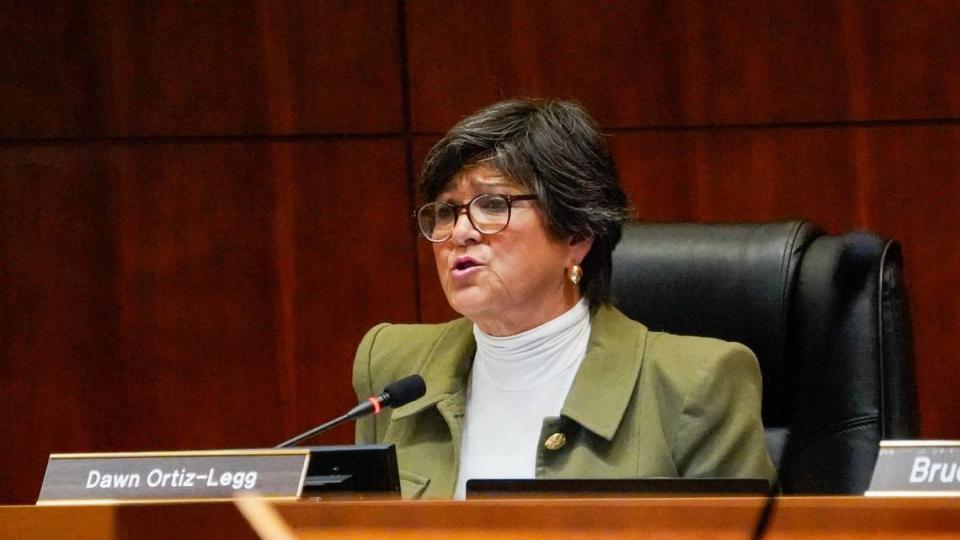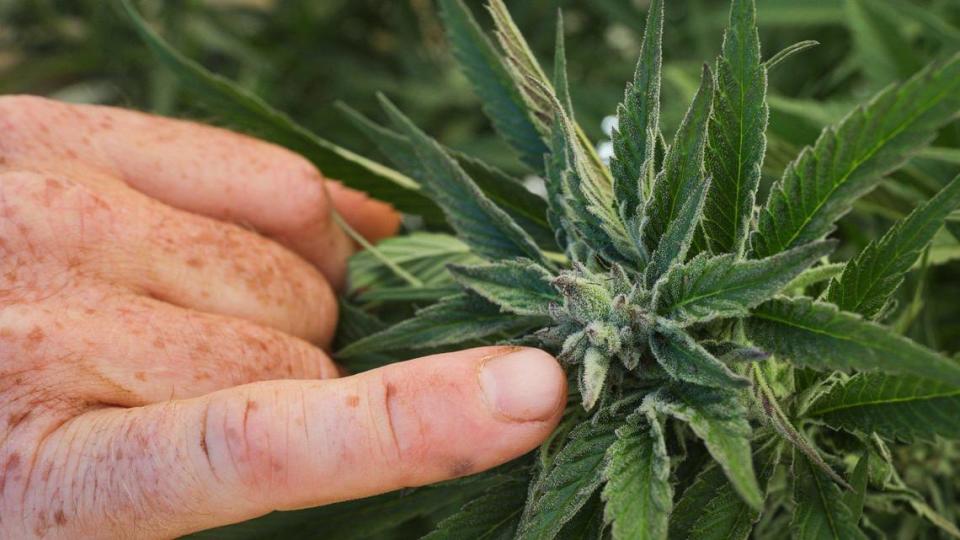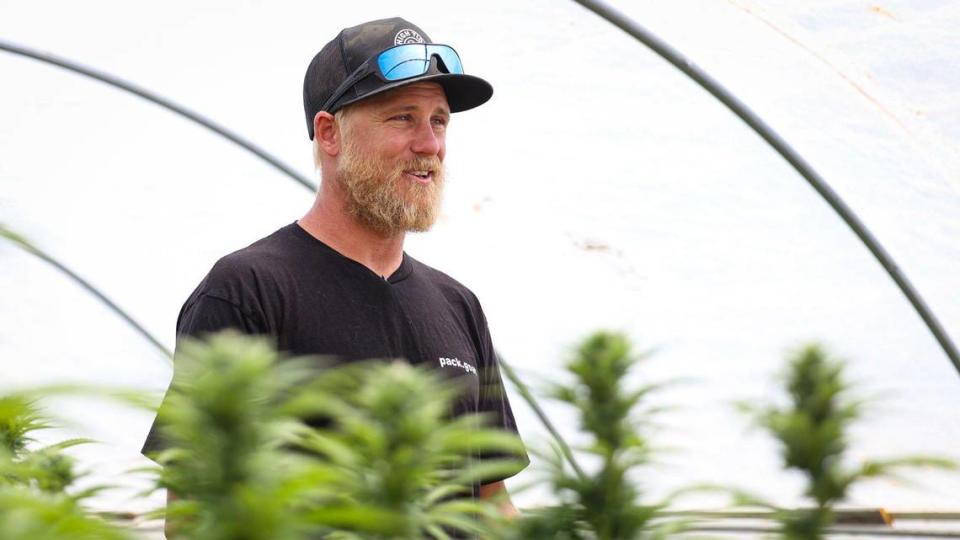Cannabis business owners say SLO County is too expensive to operate in. Will tax freeze help?
Struggling cannabis businesses in San Luis Obispo County won’t have to pay extra taxes next year as initially planned.
The San Luis Obispo County Board of Supervisors voted 3-0 on Monday to freeze the county’s cannabis business tax rate at 6%. Supervisors Jimmy Paulding and Debbie Arnold were absent from the meeting.
Without action from the board, the tax rate would have jumped to 8%, according to Justin Cooley, the deputy director of the Auditor-Controller-Treasurer-Tax Collector’s Office. With the 6% tax rate, the county’s estimated revenue will drop from $1 million to $750,000, he said.
Cannabis business owners urged the board to freeze the tax or even consider reducing it. The tax, combined with fees for inspections, permits, background checks and license renewals, makes it difficult for cannabis business owners to pay their bills, they said.
“Would you rather have 6% of something or 8% of nothing when the businesses are forced to shut their doors and go elsewhere?” cannabis business owner Steven Herring said at public comment.
During discussion, Supervisor Dawn Ortiz-Legg said she eventually hopes the county can make a profit off of the local cannabis industry to fund education efforts on the impact of cannabis on children.
“I want these guys to be able to grow their businesses and flourish here,” Ortiz-Legg said at the meeting.

Grand jury: SLO County should lower fees on cannabis businesses
The vote came days after a grand jury report advised the county to analyze its fee structure and background check protocols to evaluate where it could reduce costs for cannabis businesses.
The San Luis Obispo County Sheriff’s Office manages the Cannabis Compliance Unit, which oversees the county’s cannabis business licensing and monitoring. The 11-member staff investigates illegal cannabis operations and manages background checks and site inspections for legal cannabis businesses, the report said.
According to the grand jury, San Luis Obispo County’s cannabis industry is shrinking, stifled by high fees and stringent regulations.
When cannabis was legalized in 2016, more than 400 legal cannabis operators worked in unincorporated areas of the county. By 2023, that number dwindled to 25, the report said.
Cannabis operators said businesses closed or moved to neighboring counties during the past six years to escape high fees.
According to the report, San Luis Obispo County charges higher fees than its neighbors. For example, cannabis operators in unincorporated areas pay $24,930 for an initial background check and $18,000 each year after that for annual checks. In Santa Barbara County, an initial background check costs about $5,000, the report said.

Despite the high fees, the county still isn’t generating enough revenue to cover the costs of enforcement, the report said. During fiscal year 2024-25, enforcement is expected to cost about $2.1 million, while fee revenue is projected at only about $1.1 million, the report said.
During fiscal year 2023-24, the county General Fund gave $1.1 million to the Cannabis Compliance Program to close a gap in funding. It is projected to contribute $950,000 to the program again this fiscal year, the report said.
Cannabis businesses in unincorporated parts of the county are also required to pay a tax on their gross receipts — how much that should be being the subject of Tuesday’s meeting.
The report concluded that lowering fees could reduce pressure on cannabis businesses and increase the county’s revenue.
“In jurisdictions where cannabis programs generate revenue, they treat cannabis businesses in the same manner as any other legitimate business,” the report said. “This may include streamlining the licensing process, reducing fees and lowering excise taxes.”
The grand jury advised the board to reduce fees on cannabis businesses to align with neighboring cities and counties and review staffing levels for the Cannabis Compliance Program to evaluate if it is overstaffed.
The Sheriff’s Office should also analyze the background check process to see where it can cut costs and reduce fees, the report said.
The recommendations from the civil grand jury are advisory only, but the board and the Sheriff’s Office have until Dec. 31 to respond to the report with their findings.
County supervisors freeze cannabis tax
The grand jury report wasn’t exactly revealing new information. Cannabis business owners have petitioned the county for years to find ways to reduce fees, including adjusting the business tax to make it less cost-prohibitive.
In 2018, San Luis Obispo County voters passed Measure B-18, which imposed a monthly, 4% tax on the gross receipts of each cannabis business in unincorporated areas, Cooley said. Starting in 2020, the tax was slated to automatically increase each July with a cap of 10%.
Even though the ballot measure set a schedule for how and when the tax would increase, the board is allowed to freeze the tax or reduce it to as low as 4%, Cooley said.
In 2021, the board voted to hold the tax at 6%, before increasing it to 8% as planned in 2022. The board then voted to reduce the tax to 6% in June 2023.
Without further action from the board, the tax will next increase to 8% in July 2025.
According to Cooley, tax revenue increased when the county lowered the tax. In fiscal year 2022-23, when the tax was 8%, the county collected $597,748. Then, during fiscal year 2023-24, the county collected $702,071 with the 6% tax rate.
“We’ve seen the taxes go down to 6% and we’ve seen tax revenue increase, so I would think that we would want to follow that trend,” local cannabis business operator Justin Carlson said at the Tuesday meeting. “Bring taxes down, more cultivators come in.”

Local cannabis business owner Michael Joseph said he was able to hire two more employees under the 6% tax rate.
“That 2% difference is huge for us,” he said. “If it goes to 8%, we’re going to have to shut our doors.”
He asked the board to permanently freeze the tax rate at 6% or even 4% to attract more businesses to the county.
“I know we have about 10 more people that left this town, this county. At 6% to 4% — if it was firm — I think they’d come back,” Joseph said. “What we really need to do is generate more money by getting more businesses going.”
Cannabis business owner Shawn Bean suggested that the county allow brick-and-mortar cannabis storefronts in unincorporated towns. Those would generate more tax revenue and help the county make a profit, he said.
“We need to look at some more levers to pull besides just increasing the tax rate,” Bean said.

 Yahoo Finance
Yahoo Finance 